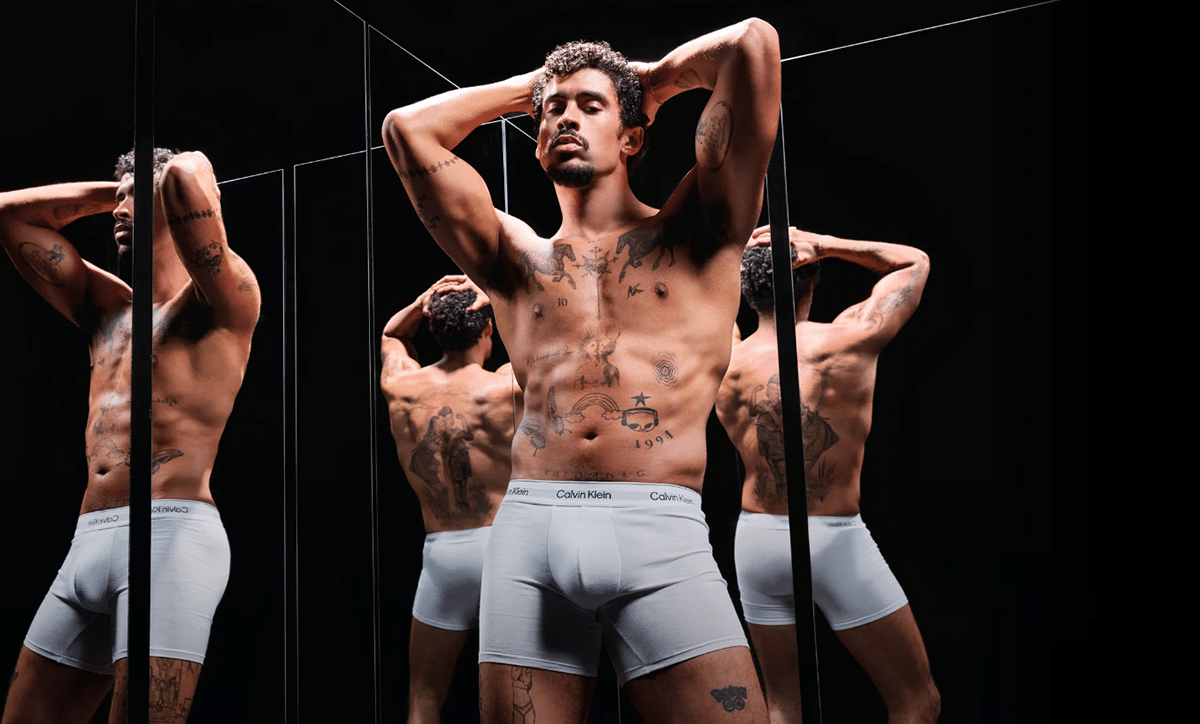On an unsuspecting Monday evening in March, Calvin Klein broke the internet (and our brains) when they released a smoldering campaign featuring the multi-hyphenate trap star turned international powerhouse, Bad Bunny. Wearing nothing but a thin pair of CK briefs, his stripped-down photoshoot was thematically congruent with his latest project, DTMF, an album where he’s arguably at his most naked, intimate, and emphatically himself.
Landing a Calvin Klein underwear ad is not just a well-paid gig, it’s a career-maker. The fresh faces that star in them possess a simmering subversiveness that reminds us, regardless of age, of a time when we were hit with the Molotov cocktail of hormones and erupted in pimples. It’s a time when teenage lust has yet to mature into full-bodied desire – the seduction lies in the promise of a future, with no limits or plan on how to get there. For a star, a Calvin Klein underwear ad is a marker of undeniable status.
To put it another way, in a consumerist and image-focused industry where desirability is the goal and envy the conduit, Calvin Klein ads serve as a cultural barometer for white, upper-middle-class sexuality. They tell us who and what the culture is lusting after (as controversial as their objects of desire may be). Calvin Klein ads cosplay as provocative – but upon deeper inspection, they’re not really “controversial and boundary-pushing,” more leftover branding from the early aughts than anything boundary-pushing.
What they actually do is elevate their subjects to cultural iconography through manufactured glamour. A 15-year-old Brooke Shields, Marky Mark, viral Jeremy Allen, a waifish underage Kate Moss, a toned and unjustly banned FKA Twigs, and a precocious twelve-year-old Millie Bobby Brown, all stars that might have otherwise been overlooked due to height, age, or race are launched into the stratosphere of celebrity. They are aspirational, covetable, and undeniably cool. This is the Calvin Klein effect.
Puerto Ricans have been historically pressured to cater to a white audience when they cross over: to speak English, straighten the kinks out of their hair, and become Americanized. Benito never capitulated to the pressure to assimilate or make his lyrics “more globally appealing.” His passion is local; his metaphors straight from la marquesina. He reminds me of the titeres I was cautioned to avoid because “boys like that wouldn’t amount to anything.” Now he’s overlooking the glossy-haired, pinched-nose gallerinas from a billboard in SoHo. There’s making it, and then there’s making it as yourself. Only a select few artists can claim that title.
It may seem frivolous, if not outright supercilious, to write about the public spectacle of an underwear ad in the face of our rapidly declining civil liberties, the vilification of DEI, the needless and cruel ICE raids, the horror of watching students of color disappear from America’s campuses, and so many other ferocious assaults on ethnic and racial minorities in this country. Let’s not forget, though, that Bad Bunny is also a political artist – he’s been an outspoken critic of President Trump ever since Hurricane María.
We must grasp the moments of lightness if we are going to carry on in the dark. Even if it comes in the form of a small strip of white cotton. Puerto Ricans who survived the first Trump Administration and the darkness that blanketed the island for 11 months in the aftermath of Hurricane María, Bad Bunny included, know all about that.
We are a part of a country that relentlessly attempts to strip us of our dignity, and crucially, hope. Conservative dog-whistles have acquired a histrionic pitch, invoking wholesome family values of a fictitious yesteryear. Bad Bunny, with his heavily tattooed body and explicit lyrics that celebrate gender queerness, sexual fluidity, and putería, grinds against these repressive forces.
The body, especially the bodies of people of color, is a site of political warfare. Benito’s extensive body of work, much of which is represented in the album iconography tattooed all over his body, does the talking [en non-English].
His penetrating gaze, unflinching and defiant, is charged with a powerful eroticism, the way that sex often, if not always, involves a game of power. His gaze dares the viewer to meet him at his level. In spite of being the object of desire – objectified, yes, but also commodified – he looks out at the viewer with self-assuredness. We, the viewer, the world, are what he hopes to conquer. With his Calvin Klein ad and really all his work, Benito knows he’s on top.

